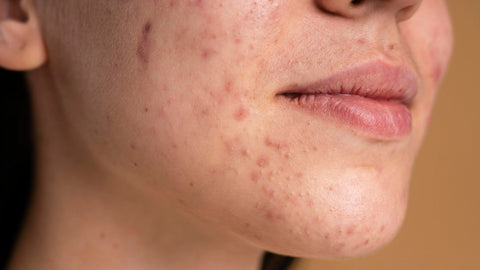Collagen has gained popularity for its numerous skin benefits, but many wonder if it might also contribute to acne.
This article explores what collagen is, how it supports skin health, and the potential link between collagen and breakouts.
It discusses possible reasons collagen could trigger acne, ways to determine if it’s affecting your skin, and tips for prevention.
Along the way, other factors that may play a role in acne development are also considered.
Keep reading to uncover the truth about collagen and your skin.
What is Collagen?
Collagen is a vital protein that serves as a key structural component of the skin, connective tissues, and various organs in the body. It plays a fundamental role in providing structural support, elasticity, and hydration to the skin, making it essential for maintaining a youthful and healthy appearance. As we age, collagen production naturally declines, leading to visible effects like wrinkles, reduced skin elasticity, and other skin concerns. Understanding collagen types, sources, and its impact on skin health is crucial for anyone aiming to achieve their skin goals.
How Does Collagen Benefit the Skin?
Collagen provides numerous benefits for the skin, making it a crucial element in any skincare regimen aimed at achieving healthy and youthful skin. It enhances skin hydration, improves skin texture, and contributes to the skin's overall firmness and elasticity. Collagen's role in skin health includes boosting collagen production, reducing wrinkles, and providing anti-inflammatory properties that soothe various skin conditions. The right balance of collagen can help combat the effects of photoaging and promote a happy skin environment.
Can Collagen Cause Acne?
The relationship between collagen and acne has raised questions among many individuals concerned about their skin health. While collagen itself is not a direct cause of acne, certain factors associated with collagen supplements and skincare products may trigger acne breakouts in some people. Understanding these associations is essential, especially for those using collagen-rich foods or beauty products as part of their skincare routine, as well as consulting a dermatology provider for personalized solutions to skin concerns.
What Are the Possible Reasons for Collagen Causing Acne?
There are several potential reasons why collagen may be linked to acne breakouts, primarily when individuals start using collagen supplements or skincare products. One common reason is an allergic reaction to specific collagen sources, such as marine or bovine collagen, which can lead to skin irritation and acne. Other factors like pore clogging from certain formulations or increased oil production can exacerbate skin conditions, causing unwanted breakouts.
These mechanisms can create a challenging landscape for individuals seeking to improve their skin health.
- Allergic reactions: Many people might unknowingly react to collagen derived from animal products, leading to inflammation and compromised skin barriers.
- Pore clogging: Some collagen-infused products may contain additional heavy ingredients that contribute to blocked pores and, subsequently, acne.
- Oil production: Increased oiliness can stem from hormonal fluctuations, which are sometimes aggravated by collagen supplementation.
To mitigate these adverse effects, individuals might consider adopting a diligent skincare routine that emphasizes non-comedogenic products, as well as monitoring dietary choices that support collagen synthesis without triggering reactions. Incorporating foods high in antioxidants and omega-3 fatty acids can also promote better skin health and manage oil production more effectively.
Allergic Reaction to Collagen Supplements
An allergic reaction to collagen supplements can manifest as skin irritation, redness, or even acne breakouts, particularly in sensitive individuals. This reaction may be due to the source of collagen, such as marine or bovine, which some people might be intolerant to or allergic to.Identifying potential allergic reactions involves noting changes in skin condition or digestion following the introduction of a new supplement. Common symptoms include:
- Itching or swelling
- Rashes or hives
- Gastrointestinal distress
- Breathing difficulties in severe cases
Keeping a detailed record can help pinpoint specific sensitivities. When selecting collagen supplements, opting for high-quality products is crucial, as they are less likely to contain allergens or impurities.
Consulting a healthcare provider not only offers personalized advice but also ensures safe usage tailored to individual health needs.
Clogging of Pores
Collagen-rich skincare products, while beneficial, may sometimes clog pores, leading to the formation of acne. Ingredients used in certain collagen formulations might not be suitable for all skin types, particularly oily or acne-prone skin.
Individuals often find themselves grappling with the unintended consequences of certain formulations that pack too much heaviness or oily components, especially if they have naturally oily or combination skin. Products designed to enhance skin elasticity can inadvertently become culprits in pore congestion, making it essential to discern which items deserve a spot on the vanity. To avoid complications with breakouts, one should:
- Choose non-comedogenic formulations that specifically state they won't block pores.
- Investigate the ingredient list, looking for lightweight oils or substances known for their breathable nature.
- Establish a daily routine that emphasizes gentle cleansing and balancing hydration to keep the skin healthy.
Taking these steps can play a pivotal role in mitigating the risk of acne, ensuring that the skin receives the benefits of collagen without the downsides.
Increased Oil Production
In some cases, collagen supplements may trigger increased oil production in the skin, which can worsen existing acne or contribute to new breakouts. The balance of moisture and oil is crucial for maintaining healthy skin, and any disruption can lead to skin concerns.
Understanding how collagen impacts sebum production is essential for those looking to maintain a clearer complexion. This increase in oil, possibly linked to hormonal changes or skin's response to external factors, might not only aggravate acne but can also lead to larger pores and a shiny appearance. To combat these effects, lifestyle adjustments can play a significant role.
- Dietary Habits: Incorporating a diet rich in antioxidants, such as fruits and vegetables, may help reduce inflammation.
- Hydration: Drinking plenty of water is critical for skin health, as it can keep oil production in check.
- Skincare Routine: Properly cleansing the skin can remove excess oils and prevent clogging.
Ultimately, finding the right balance of nutrients while managing collagen intake can lead to healthier skin and fewer breakouts.
How to Determine if Collagen is Causing Acne?
Determining whether collagen is causing acne can be a complex process that requires thoughtful observation and possibly a consultation with a dermatology provider. Keeping a detailed skincare routine and noting any changes in your skin condition after starting collagen supplements or products can provide valuable insights. In some cases, professional guidance may be necessary to identify the root cause of acne effectively.
How to Prevent Acne Caused by Collagen?
Preventing acne potentially caused by collagen involves a combination of careful selection of collagen supplements and maintaining a meticulous skincare routine. Strategies such as consulting with a dermatologist, choosing high-quality collagen products, and ensuring proper cleansing and moisturizing can significantly reduce the risk of breakouts.
Consult with a Dermatologist
Consulting with a dermatologist is a crucial step for individuals struggling with acne, especially if they suspect collagen may be the culprit. Dermatologists can assess skin conditions, recommend effective skincare solutions, and provide personalized formulas tailored to individual needs.
A professional evaluation not only helps in identifying potential allergens or irritants but also incorporates holistic approaches to skincare.
- They can suggest specific collagen products that will best suit skin type and condition.
- Guidance on daily routines and sun protection can minimize further damage.
- Regular follow-ups ensure that treatments are effective and adjustments can be made promptly.
By customizing a personalized skincare plan, dermatologists enable individuals to embrace their skin confidently while addressing concerns more profoundly.
Use Collagen Supplements with Caution
Using collagen supplements with caution is essential for those who have experienced acne or have sensitive skin. It’s advisable to start with lower doses and monitor skin reactions, ensuring that the chosen supplements are from reputable sources and complemented by collagen-rich foods.
The journey towards enhancing skin health begins with careful selection of collagen supplements that suit individual needs. Understanding the unique reactions of sensitive skin is crucial; thus, starting with a minimal amount can help gauge how the body responds.
Incorporating these supplements gradually allows one to observe any positive or adverse changes in skin texture, tone, and overall appearance. It’s beneficial to complement collagen supplementation with a balanced diet rich in vitamins, minerals, and antioxidants that support skin structure. Consider including:
- Leafy greens
- Fruits like berries and oranges
- Nuts and seeds
This holistic approach ensures that every nutrient works synergistically, enhancing the effects of collagen for a more radiant complexion.
Keep Skin Clean and Moisturized
Keeping the skin clean and moisturized is vital for preventing acne, especially when using collagen supplements or products. A proper skincare routine that includes gentle cleansing and effective moisturizers can help maintain skin hydration and prevent pore-clogging.Establishing a beneficial skincare routine involves several essential steps. It’s crucial to start with a gentle cleanser that effectively removes dirt and excess oil without stripping the skin of its natural moisture.
Daily cleansing should usually occur twice—morning and evening—for optimal results. Follow up with a toner to balance the skin’s pH and prepare it for subsequent products.
Moisturizers tailored to one’s skin type, be it oily, dry, or combination, will help lock in hydration. Incorporating serums that cater to specific concerns, like blemishes or fine lines, can enhance the routine.
Remember to prioritize hydration, as well as exfoliate 1-2 times a week to slough off dead skin cells. Keeping these steps in mind can lead to healthier, more radiant skin.
Other Factors that Contribute to Acne
While collagen might play a role in acne development, several other factors can also contribute to this common skin condition. Hormonal changes, dietary habits, and the use of specific skincare products can all influence skin health and acne occurrences, making it important to consider these variables when addressing skin concerns.
Hormonal Changes
Hormonal changes, particularly during puberty, menstruation, or pregnancy, can significantly impact acne development and overall skin health. Fluctuations in hormone levels can lead to increased oil production, clogged pores, and ultimately, acne breakouts.This connection between hormones and skin can also be influenced by various life events and stressors. For instance, during stressful periods, the adrenal glands may produce more cortisol. This surge can exacerbate existing skin conditions, leading to flare-ups. Managing these hormonal shifts is crucial for maintaining a clearer complexion.
Here are some practical tips to help control this type of acne:
- Maintain a Consistent Skincare Routine: Use gentle cleansers and non-comedogenic moisturizers to prevent clogging.
- Incorporate Healthy Foods: A balanced diet rich in fruits, vegetables, and whole grains can support skin recovery.
- Stay Hydrated: Drinking plenty of water helps to flush out toxins and keep the skin hydrated.
- Manage Stress: Engage in mindfulness or relaxation techniques such as yoga or meditation.
By addressing these lifestyle factors, one can significantly reduce the chances of hormonal acne and promote healthier skin overall.
Diet and Lifestyle
Diet and lifestyle choices play a crucial role in maintaining skin health and preventing acne. Consuming a balanced diet rich in vitamins, minerals, and antioxidants, alongside healthy habits, can contribute to healthier skin and reduce the risk of acne breakouts.
In terms of achieving glowing skin, the significance of dietary recommendations cannot be overstated. Incorporating foods high in Vitamin C, like oranges and strawberries, helps in collagen production, essential for skin elasticity and hydration. Collagen-rich foods such as bone broth and leafy greens promote a robust skin structure. It's vital to address lifestyle factors that influence skin health.
- Managing stress through mindfulness practices can significantly reduce hormonal triggers of acne.
- Staying well-hydrated aids in flushing out toxins, directly impacting skin clarity.
- Ensuring adequate sleep allows the skin to repair and regenerate, minimizing the chances of breakouts.
By harmonizing dietary choices with mindful living, individuals can foster an environment conducive to radiant and healthy skin.
Skincare Products
The choice of skincare products can greatly influence the skin's condition and the occurrence of acne. Selecting non-comedogenic and pH-balanced products while ensuring proper moisturizing can help maintain skin hydration without exacerbating acne.
The significance of properly understanding formulations cannot be overstated, as it enables individuals to make informed choices. For effective skincare, one should focus on ingredients that provide hydration, like hyaluronic acid or glycerin, while avoiding harsh additives.
- Being attentive to the order of application is crucial; starting with lighter serums followed by thicker creams is often recommended.
- Incorporating a dedicated sunscreen into the routine can protect against damaging UV rays.
Ultimately, consistency in following a tailored skincare regimen fosters resilience and vitality in the skin, allowing one to achieve a clearer complexion over time.
Conclusion
While collagen is a fundamental protein for skin health, it is essential to understand its role and how it interacts with various factors that contribute to acne.This understanding is pivotal for anyone seeking clearer skin. A balanced approach to skincare involves not only the strategic use of collagen but also the selection of the right ingredients tailored to individual skin types.
- For instance, hydration plays a crucial role; drinking enough water can enhance skin elasticity.
- A diet rich in antioxidants can combat inflammation, further supporting skin health.
Incorporating these elements alongside collagen will foster a holistic skincare regimen. Ultimately, raising awareness about how lifestyle, product choices, and supplemental aids work synergistically can enable individuals on their journey to achieving that coveted clear, radiant complexion.
Frequently Asked Questions
Can collagen cause acne?
There is limited research on the direct relationship between collagen and acne. However, some studies suggest that high levels of collagen in the body may contribute to acne breakouts in certain individuals.
How does collagen affect the skin?
Collagen is a protein that helps maintain skin elasticity, firmness, and hydration. However, excessive collagen production or consumption, especially from hydrolyzed collagen, may trigger inflammation and disrupt the balance of other skin proteins, potentially leading to acne.
Does increasing collagen intake from dietary sources cause acne?
Again, there is no conclusive evidence that collagen directly causes acne. However, consuming excessive amounts of collagen through supplements or treatments may lead to an increase in overall protein levels in the body, which can potentially affect the skin and contribute to acne breakouts.
Can topical collagen products, such as exposed skin care lines, cause acne?
In general, topical collagen products are not known to cause acne. However, if the product contains other ingredients that can clog pores or irritate the skin, it may contribute to acne breakouts.
Are there any specific types of collagen that are more likely to cause acne?
There is no specific type of collagen that has been linked to acne breakouts. However, collagen supplements derived from marine sources may contain high levels of iodine, which can exacerbate acne in certain individuals.
How can I prevent acne while using collagen products and dietary supplements?
To prevent potential acne breakouts while using collagen products, it is important to choose products that are non-comedogenic and to maintain a proper skincare routine. Also, be mindful of any other ingredients in the product that may irritate your skin or clog pores.






